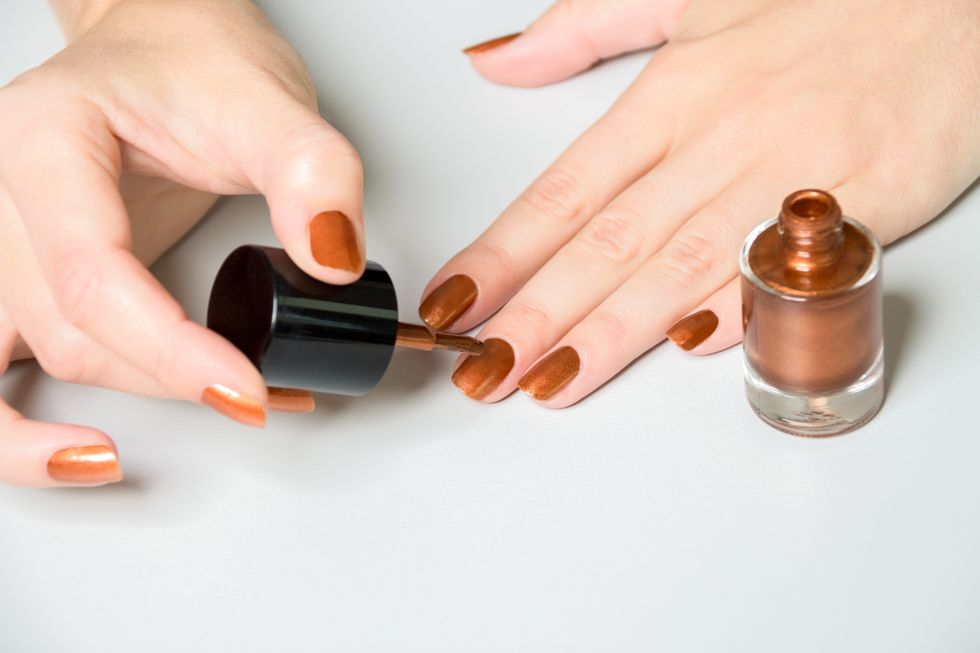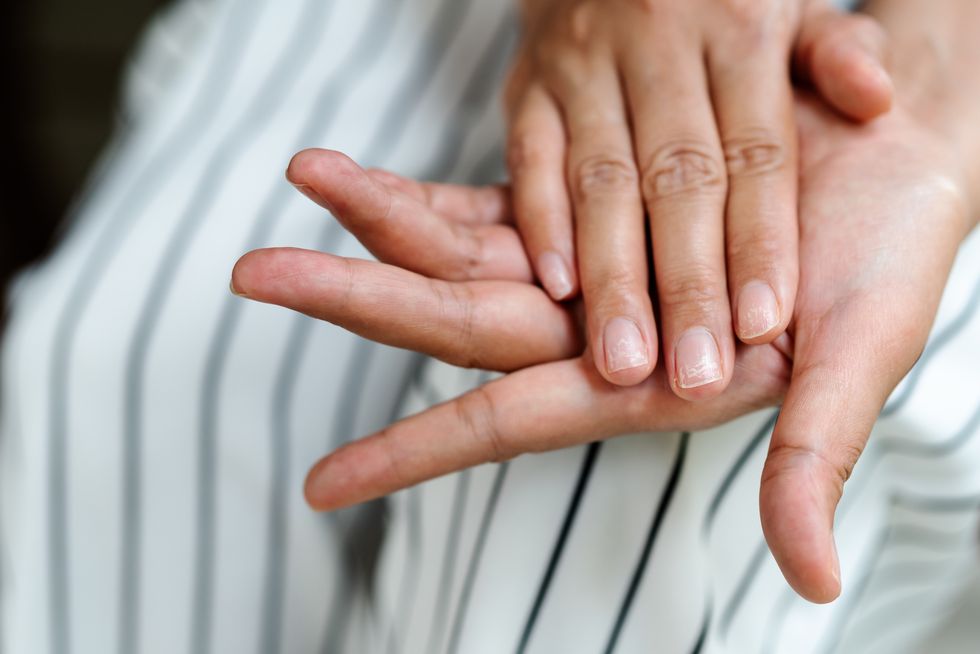Vitamin deficiencies and dehydration are just some of the issues that can emerge in nailbeds
GETTY
There is nothing more powerful than HRT for combatting menopause, but there are ample food options to tackle unsightly changes in the nails. GB News is looking at the best meal plans to combat symptoms. According to experts, five factors are essential for promoting stronger growth and better texture as the body tackles hormonal decline
Don't Miss
Most Read
Trending on GB News
Checking nails for anomalies isn’t just a standard beauty routine. It can reveal a wealth of information about hygiene and health.
From brittleness to ridges, the cartilage at our fingertips harbours intricate details about the issues evolving deeper within the body, often reflecting dehydration, nutritional deficiencies or a hormonal decline.
The most common problem women are likely to spot when they reach their 50s is slow growth triggered by changes in their hormonal makeup, an expert told GB News.
“During menopause, women may experience changes in nail health due to hormonal fluctuations and other physiological changes, that occur during this state of life,” Daniel Heman, NASM nutritionist and founder of www.bio-synergy.uk explained.

Steering clear of harsh nail polish may promote stronger growth
GETTY
“Oestrogen which plays a significant role in maintaining skin and nail health, declines during menopause. As oestrogen levels decrease, nails become weaker, brittle and more prone to breakage.
“Common issues to arise as a result of that may include nails becoming more brittle and prone to splitting and slower nail growth. More breakages are also likely. Some women may develop ridges or lines on their nails, which can affect their appearance.”
Many health bodies suggest collagen is a one-stop solution to these problems, but broader lifestyle changes may offer longer-term results.
“To combat these changes and support nail health during and after menopause, incorporating certain foods and supplements into the diet may be beneficial," Daniel explained.
“Nails are primarily made of protein so consuming an adequate amount of protein-rich foods like lean meats, poultry, fish, eggs, dairy products, legumes and nuts can support nail strength and growth, as can supplementations with collagen and/or protein powder."
Biotin
Biotin, a protein found in highly concentrated egg yolk and dairy products, can strengthen nails and improve their growth.
“Biotin, also, known as vitamin B7, is essential for healthy nails," explained Daniel. “Foods rich in biotin include eggs, nuts, seeds, whole grains, bananas and avocadoes."
In 2016, the widely reported story of beauty blogger Rushmore-Perrin offered a real-life account of the benefits of biotin.
The influencer claimed the nutrient brought her nails back to life after an acrylic manicure left them peeling and bleeding.
The Mayo Clinic says biotin is critical for the formation of fatty acids and glucose, which fuel the body.
As a B vitamin, biotin also provides the building blocks for healthy hair and nail production, according to a New York-based board-certified dermatologist and director of cosmetic and clinical research in dermatology at Mount Sinai Medical Center.
Omega-3 fatty acids
Found in fatty fish like salmon, mackerel and sardines as well as flaxseed chia seeds, and walnuts, omega-3 fatty acids help nails in various ways.
One of their key roles is decreasing inflammation in the nail beds, helping them last longer without breaking.
This is why experts often take bendy nails and frequent fingernail breakages as a sign of low omega-3 fatty acid levels.
“Adequate intake of vitamins and minerals such as vitamin C, vitamin E, zinc and iron is also important for nail health," explained Daniel. “Foods rich in these nutrients include citrus fruits, berries, leafy green vegetables, nuts, seeds, whole grains, lean meats, and legumes."
Hydration
It is widely known that drinking water is essential for the overall health of the body, but the nails are no exception.
“If you’re dehydrated, your nails will be too," explained Chelsea Lea MacColl, Nutritionist and founder of Chelsea Lea Nutrition.
"Drink plenty of water and electrolyte-rich benefits, and use a high-quality cuticle oil regularly."
Vitamin deficiencies and supplements
Vitamin deficiencies often manifest in the appearance of our nails, so it may be worth considering a high-quality multivitamin if your diet is lacking.
“Supplements can be a great way to boost your nutrient intake," noted Chelsea. "Protein powders, bovine and marine collagen, omega-3s, or multivitamins will all positively impact nail health and growth.”
Nail gel
With the natural changes that come hand in hand with age, it may be worth steering clear of additional stressors like nail polish.
Without avoiding harsh chemicals and limiting the exposure of nails to water, the habits mentioned above can only go so far in improving nail health.
With prolonged use, chemical-laden nail polishes inflict significant damage by suffocating the nail beds. This, in turn, contributes to the thinning and cracking of nails. In more extreme cases, infections may ensue.
What's more, nails consistently concealed under layers of gel polish will begin to look worse and worse as the nail bed becomes deprived of oxygen.
A recent study listed gel, shellac and acrylic as the main culprits. It warned that women who regularly coat their nails with these products could face grave risks further down the line.
UV dryers used in nail salons to solidify gel manicures were also found to cause DNA damage to the hands.
As such, women who have made frequent use of these treatments in the past could be encouraged to forego them and use a strengthening treatment instead.
Meal plan
Because nails are made predominantly of protein, a protein-rich diet is essential for reducing muscle tissue breakdown and supporting nail production and regrowth.
“Instead of saving your protein intake for later in the day, try to include it in every meal or snack," said Chelsea. "Pair your protein sources with a colourful array of fruits and vegetables to maximise nutrient absorption."
According to the nutritionist, the following meal plan encompasses all the foods essential to optimal nail health.
Day one:
Breakfast
Greek Yoghurt and Berries: 200 grams Greek yoghurt with 80 grams mixed berries, 1-2 tbsp of mixed seeds - chia, flaxseeds, hemp, pumpkin seeds
Lunch
Smoked Salmon and Eggs: 50 grams smoked salmon, two eggs, roasted vine tomatoes and wilted spinach on a wholemeal or sourdough bagel.
Dinner
Dinner cashew stir fry
- 100 to 130 grams raw chicken breast per person
- 50 grams cooked Quinoa per person
- Mixed vegetables - broccoli, edamame, beans, red bell pepper
- (Sauce of choice, hoisin or oyster work well)

Environmental stressors like nail polish could hinder nail health over time
GETTY
Day two:
Breakfast
Protein bowl
The base:
- 30 grams vanilla protein powder and 150 grams yoghurt or 200-250 grams Greek yoghurt.
- 10ml maple syrup
- 1/3 banana mashed
Toppings:
- ½ banana/50 grams sliced
- 30 grams granola /oats/seeds
- Five ml chocolate sauce
Lunch
Creamy avocado and eggs on toast
- One wholemeal or sourdough toast, two to three eggs scrambled with two tablespoons cottage cheese, 60 grams avocado, one tbsp seeds, a drizzle of sweet chilli sauce or a sprinkle of chilli flakes, salt and pepper.
The cottage cheese makes the eggs extra creamy and boosts the protein content.
Dinner
Mixed bean chilli and sweet potato jacket potato
(Serves four people)
- One medium-sized sweet potato per person
- 400 grams to 500 grams of lean beef or turkey mince per person or omit for a meat-free meal and add an extra tin of beans
- Two tsp ground cumin, one tsp smoked paprika, one tsp cinnamon, half a tbsp medium or hot chilli powder
- One large onion, one red pepper, a whole bag of spinach, two tins of legumes (kidney beans, black beans, chickpeas, butter beans
- One tin chopped tomatoes, three tbsp tomato puree, 200ml beef/vegetable stock
- Salt and pepper to taste
- Serve on top of your jacket potato with a big dollop of Greek yoghurt, coriander and avocado if you wish.
Top tips
According to Chelsea, taking your supplements alongside food will help absorption. Conversely, she recommends never taking them at the same time as caffeine as this can hinder absorption.








